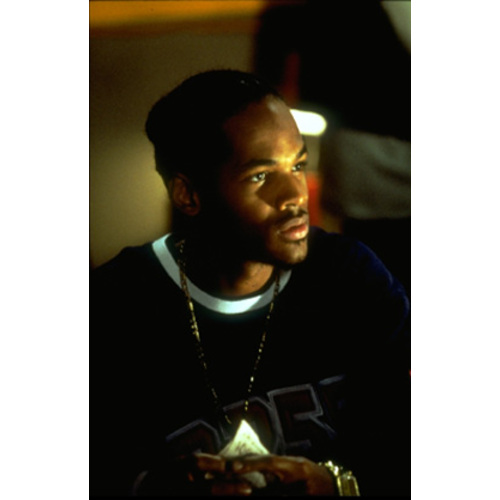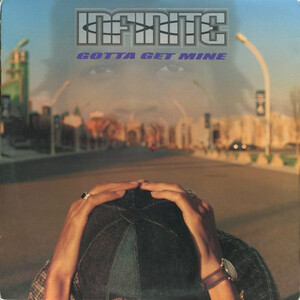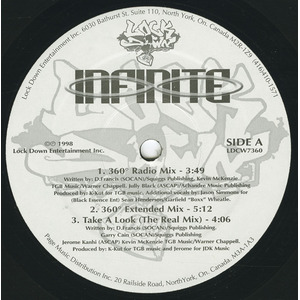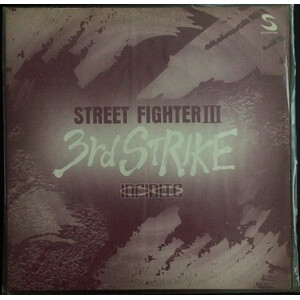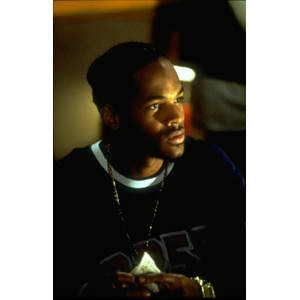Infinite
Websites:
No
Origin:
Rexdale, Ontario, 🇨🇦
Biography:
Toronto emcee and producer Infinite (born Desmond Francis) emerged as a powerful and poetic voice from Rexdale, one of Toronto’s most underserved and overlooked neighborhoods. Known for his razor-sharp flow, vivid storytelling, and commitment to uplifting the community, Infinite carved a distinct path through Canada’s hip-hop underground, helping to define an era of authentic, street-rooted rap in the late 1990s and early 2000s.
A founding member of the acclaimed group Ghetto Concept, Infinite first rose to prominence in the mid-1990s, when the group earned a Juno Award for Best Rap Recording in 1995. But his trajectory took a dramatic turn following the tragic murder of his older brother that same year. Grieving and seeking new purpose, Francis left Ghetto Concept and focused his energy on solo expression — creating work that balanced raw street wisdom with introspection and hope.
In 1997, Infinite burst onto the national scene with “Gotta Get Mine,” a searing, self-produced anthem released on RapEssentials Volume 2 (Beat Factory/EMI). With its crisp production and cinematic video, the single marked a turning point for Canadian urban music, breaking barriers on both commercial radio and MuchMusic. The video’s slick visuals and socially conscious message set a new benchmark for the independent hip-hop scene, earning rotation on MuchMusic and landing Infinite a slot on Energy 108’s Top 108 of 1997.
His debut solo EP, 360°, followed soon after — a polished and thematically unified record that generated no less than five music videos, all of which aired regularly on MuchMusic. The EP, distributed independently through his label Lockdown Entertainment Inc. (co-run with his brother Cain), sold over 5,000 copies within its first year — a remarkable feat in Canada’s still-nascent hip-hop infrastructure.
Infinite’s music blended gritty realism with optimism, creating songs that resonated with both street-level authenticity and broader social consciousness. His lyrics reflected lived experience — growing up amid systemic poverty, racial discrimination, and violence — but also delivered messages of resilience and empowerment, aimed squarely at the next generation.
A strong advocate for youth, Infinite became the spokesperson for the "Chill Out" campaign, a high-profile winter clothing drive for Toronto’s homeless that partnered with the Toronto Raptors and Blue Jays. He also regularly appeared on Canadian TV, including hosting stints on Rap City and performances alongside legends such as The Wailers on MuchMusic’s Da Mix.
In 1998, Infinite’s national profile rose again when he toured Canada with LL Cool J, backed by FUBU, and made a cameo in LL’s Hollywood crime thriller In Too Deep (1999), starring Omar Epps. That same year, he was tapped by Capcom Japan to contribute both voice-over work and original music to the internationally released video game Street Fighter III: 3rd Strike — making him one of the first Canadian hip-hop artists to cross over into the gaming world.
His 1999 single “Take a Look,” featured on RapEssentials: The Rebirth (BMG), continued his hot streak. The track’s groundbreaking fully animated video earned heavy rotation on MuchMusic, held the #1 spot on Rap City’s Top 5 for three consecutive weeks, and helped propel the compilation to over 5,000 sales in its first week. With this success, Infinite became one of the rare Canadian rap artists of the era to maintain both street credibility and mainstream visibility — a balance few could achieve.
Despite operating independently, Infinite consistently earned accolades for his visual work, production quality, and lyrical content. His award recognition includes:
MuchMusic Video Award (MMVA) – Best Rap Video, 1997
Canadian Urban Music Awards – Best Hip Hop Video, Best Director, 1997
Juno Award Nominee – Best Rap Recording, 1997
Canadian Urban Music Award Nominee – Best Music Video, 1999
Infinite’s music remains rooted in values — self-reliance, reflection, community, and clarity of purpose. While commercial trends shifted and the industry evolved, he never diluted his message, refusing to compromise authenticity for airplay. In doing so, he laid groundwork for a new generation of Canadian MCs — artists unafraid to be both hard-hitting and human.
Today, Infinite is recognized not only for his influence on Toronto hip-hop but also for his role in pushing the envelope for Black Canadian voices in media, video, and digital art. His contributions to urban music, independent artistry, and multimedia storytelling remain a vital part of Canada's hip-hop legacy.
-Robert Williston
